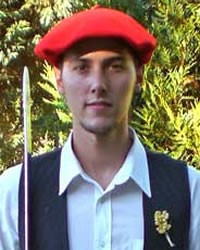The Basque people have lived in the Pyrenees Mountains that straddles Spain and southern France since before the Roman Empire. They were there before the Iberians arrived in Spain. The Basques themselves would claim that they have never been conquered, though, judging from the amount of borrowed words from Latin to the Basque language, euskera, they must have had regular contact with the Romans around the time of Christ.
From Roman times to the present, the Basques have been "a group apart" in Spain. They were never actually conquered by the Visigoths, nor the Moors, and have always rebelled against Spanish domination as well. In terms of physical features (high incidence of O blood type and RH negative factor), archaeology of that region, and their unique Basque language, euskera, they are clearly an ancient people who have lived in this corner of the world and maintained their unique identity down through the centuries, even millenniums. The Basque language, euskera, is a linguistic mystery in that it has no clear relationship to any other language in the world!
Traditionally, the Basques were fishermen, sheep herders, and subsistence farmers. Until the early nineteen hundreds, their way of life was largely unchanged. During the Industrial Revolution, they began to take on a more prominent "world role" due to large deposits of iron and coal along with their skills as shipbuilders. Then during the Franco years in Spain (1935-1975), Franco encouraged Spanish businesses to move to the Basque Country in an attempt to dilute the strong Basque influence. As a result, the autonomous region, the Basque Country, is now among the most powerful economic regions in all of Spain and many small businesses and industry dot the landscape -- both in towns and cities as well as in the countryside.
Though most Basques live in their Pyrenees Mountain homeland which straddles Spain and France, some have migrated. Most Basque migrants are in Europe, though they are also represented in the Americas and the Philippines.
The Basques were prominent in Spain's colonial empire, both in the Philippines and Latin America. The Spanish Crown needed bureaucrats, ranchers, businessmen and soldiers for their colonial holdings. Others were shipbuilders and sea traders. According to Basque traditions, only the first born son would inherit the family assets. Others had to go elsewhere, and the colonies provided opportunity. Typically, the first Basques to go to Latin America were young men. As time went on, they sent for brides. Those who owned businesses sent for others in their villages to work for them.
Wherever they live, the Basques have a strong work ethic, and they love to work. They sometimes say, "I hope you have lots of work," which is their way of saying "have a great day." They value hard work over higher education, position and even money. Though Basque country is mainly rural, the Basques are noted for their ability to adjust to urban settings.
The Basques in Venezuela have formed their own clubs to preserve their culture and language. Those who came to build businesses are suffering from the ongoing economic collapse of that formerly prosperous country. As a result, some are leaving Venezuela. Those who remain in Venezuela have made their mark through politics, sports and the arts.
The Basques were among the last peoples of Spain to embrace Catholicism. When they did so, however, they did in mass. For many years, the Basque Country was the most Catholic in all of Spain. They contributed leaders to the Catholic Church, including Saint Ignatius of Loyola, the founder of the Jesuits.
The Catholic Church around the world has a mission strategy of syncretism, and this also applies to the Basques. Catholics accept the "traditional beliefs" of the new people, and then try to re-create those in a Catholic form. Catholics would say that they are successful in that. Others tend to disagree.
First of all, the Basques are a very proud people -- proud of their history, their culture and their standing in the world. And there is much for which to be proud. But as they go back to reconnect with their pagan past, many of those influences are not spiritually healthy. Even within the syncretistic Catholic Church, there are many traditions and celebrations that are not spiritually healthy. The Church´s emphasis on biblical teaching (rather than church tradition) is very weak overall.
Most Basques still claim Catholicism if they claim any religious affiliation at all it is a cultural form of Catholicism. Even in that limited sense, any real allegiance to the church has been greatly weakened in the last couple of decades.
The Basques need a constructive identity. Some put their identity in the Roman Catholic Church. However, Venezuela is home to more Bible-believing Basques than there are among Basques in just about any other part of the world.
Pray for the Holy Spirit to move among Basques in Venezuela, giving them a firm identity in Christ.
Pray for a greater understanding of the need to reach out to the Basque people in their own language, euskera.
Pray for the Lord to thrust out his children to take Christ to them in the euskera language.
Pray for a renewal among the Catholic Church of Basque Country and Spain. Pray for renewal and revival that will place their feet on the Rock.
Pray for a new movement of prayer, the International Day of Prayer for the Basque Country, that would capture the hearts of intercessors around the world.
Pray that God would call Basque believers to himself that would feel a keen burden to disciple others in the ways of Jesus Christ.
Scripture Prayers for the Basque in Venezuela.
https://www.pyreneanexperience.com/the-importance-of-work-in-the-basque-culture/
https://en.wikipedia.org/wiki/Basque_diaspora
https://www.youtube.com/watch?v=wSHnpxA12P4
https://en.wikipedia.org/wiki/Basque_Venezuelan
| Profile Source: Joshua Project |












